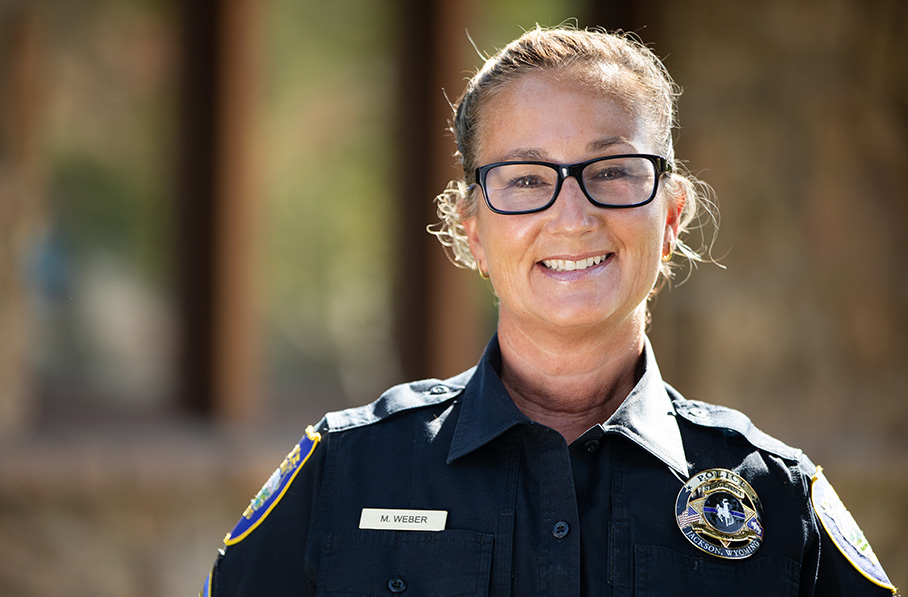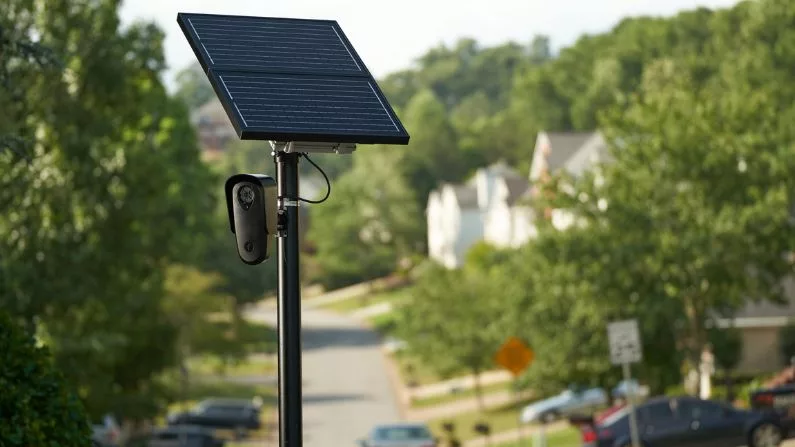The Falcons — that’s the name of the thirty solar-powered police cameras soon to be hung on street poles or traffic lights throughout Jackson.
Thanks to machine learning software, twenty-four hours a day, the cameras will scan vehicles and capture license plate numbers, along with information on car make, color, bumper stickers, decals and roof racks. The readers won’t be used to monitor speed.
The goal, supporters say, is to accelerate criminal investigations and locate missing people.
With the town’s recent approval of the Falcons, Jackson is signing on to become the first Wyoming town to join a national network of cameras, run by rising tech giant Flock Group Inc. And some local community members — and the American Civil Liberties Union (ACLU) — are concerned.
The ACLU, which vehemently opposes any use of these cameras, questions how the data are used and points to potential dangers of creating what they refer to as a “mass surveillance system” with law enforcement officers around the country.
“There’s no reason for the police to be storing our information on where we’re driving and when,” said Jay Stanley, a senior policy analyst with the ACLU’s Speech, Privacy and Technology Project.
In Jackson, data are currently slated to be stored for 90 days, and according to Jackson Police Chief Michelle Weber, it will only be accessible when the local police department launches a criminal investigation.

Jackson Police Chief Michelle Weber has led the department for the past two years. (Town of Jackson/David Stubbs)
Weber said the technology — which doesn’t include facial recognition software — is necessary as Jackson grows as a high-profile location, which she added could bring in more criminals.
“It’s easy to be a skeptic until you’re a victim of a crime and you look to local law enforcement for help,” Weber said.
‘I’m screaming “stop” as I vote “yes”’
Town council voted 3-2 at an evening meeting on June 5 to move forward with the camera purchase, but even those in favor voted with reluctance.
“I don’t like this particular arc of this particular part of history,” Councilor Jonathan Schechter said before ultimately supporting the motion. “I’m screaming ‘stop’ as I vote ‘yes.’”
Schechter said he only voted in favor since the council already approved nearly $184,800 to purchase the cameras in this year’s budget. Last week’s discussion was just about approving a recurring fee of $87,500 starting in 2025 and okaying the agreement between the town and Flock, which will own the hardware.
That contract says the town’s data can’t be sold to third-party vendors and will solely be used for criminal investigations.
That’s because, according to Flock spokesperson Holly Beilin, the company’s “north star mission” is to eliminate crime and create safer communities together. While she said only law enforcement can access the vehicle data, homeowners associations and private businesses can also purchase and install cameras on their properties.
“We’ve noticed how much the entire community is really involved in this pursuit of crime reduction,” Beilin said. “So, it’s bringing together cities and law enforcement and ordinary citizens, schools and local businesses.”
Founded in 2017, Flock was recently ranked the seventh fastest-growing tech company in North America and has placed cameras in over 3,000 communities in 45 states, Beilin said.
“We’re behind the eight ball where a lot of communities are already doing this,” Chief Weber told KHOL. “When other communities have crimes or suspects that they think have come to Jackson, we’re unable to provide as much help as we possibly could because we don’t have this technology.”
The police department already uses license plate readers to enforce parking restrictions, but the new Flock technology will be a first for the agency.
Weber said the department chose to contract with Flock because of its emphasis on individual privacy. She added these cameras will save time for the department, which is already short-staffed, and could help locate cars associated with Amber and Silver alerts.
The move comes two years after influencer Gabby Petito made national headlines when she went missing in Teton County. Weber said the police department could have made more headway quickly in that case if the cameras had been in place.
But Stanley, with the ACLU, is still skeptical: “This is a very powerful nationwide surveillance system.”
‘A slippery slope’
One of Stanley’s main qualms — the fact that the Falcons will scan and keep data on all license plates, not just those associated with criminals. He said he worries that this data could be improperly used by “bad apple” police officers and could result in wrongful accusations.
Beilin, the Flock representative, said it’s impossible to solely collect data on criminals and that the company encourages communities to conduct regular audits on how the system is being used to ensure transparency.
But Stanley said he is still worried, saying this kind of technology is unprecedented on a mass scale in the U.S.
“It’s like putting a GPS tracker on everybody’s car,” he said. “And that’s not the way we do things in this country.”
Stanley said, if communities keep adopting this kind of technology, things could go downhill — and fast.
Jackson resident Earle Lindell has the same concern, saying at the recent town council meeting that using this technology is “a slippery slope.”
“Today, they’re just going to check a license plate,” he said. “What’s tomorrow?”
Councilmember Arne Jorgensen didn’t support the motion to move forward with the cameras, taking particular issue with the recurring costs, along with Flock’s “hot lists.” These are where law enforcement agencies across the country can add license plate data of vehicles stolen or associated with a criminal or missing person case.
The camera software is integrated with state and national crime databases, like the FBI’s National Crime Information Center, and then when tagged cars pass through Jackson, the system alerts local law enforcement.
“I want to make sure that we are not using town of Jackson police resources to further some of these laws that are popping up around the country that frankly are not a priority for us,” Jorgensen said in the meeting.
Idaho, for instance, recently passed a law criminalizing people who help minors travel out-of-state for abortions. Since Idaho banned abortions last year, people from the eastern part of the state are coming to Jackson for pregnancy-ending care, which is still legal in Wyoming.
“I don’t think it’s an important use of us to be limiting interstate transportation to access health care,” added Jorgensen, who — along with Mayor Hailey Morton Levinson — ultimately voted down the camera motion.
The Flock representative said Jackson would have to opt in to share alerts with law enforcement in Idaho, and Weber said the department won’t investigate matters that aren’t crimes here, but Jorgensen said he still wants to see that in writing.
‘The clock’s ticking’
According to the International Association of Chiefs of Police, around seven in ten crimes involve the use of a vehicle.
Beilin, from Flock, said law enforcement can use license plate data to zero in on registered owners and get a lead on an investigation.
“Flock really focuses on objective data, so part of what we want to do is remove some of the human bias that is inherent in crime fighting,” Beilin said. “And what we know is that a license plate, a number and a state and then vehicle details, are about the most objective lead that any detective can get.”
Some studies have shown license plate readers didn’t have a real deterrent effect in crime hotspots. And Beilin did say that crime rates are hard to track across the board, but she also pointed to communities like San Marino, California, which she said reduced residential burglaries by over 70% after installing Flock cameras.
“We definitely think there’s a deterrent effect,” Beilin said. “It’s the certainty of someone knowing that they cannot get away with crime.”
In regards to privacy concerns, Beilin said all data are highly encrypted and only kept for a set amount of time.

The Jackson Police Department says it’s short-staffed, and information from the cameras could help fill that gap. (KHOL)
Flock is slated to keep the Jackson data for 90 days, which is longer than a lot of communities that only hold it for 30 days. The police department says this is necessary because of Jackson’s unique tourism season where many crimes aren’t reported until several weeks later.
Second-home owners, for example, may be gone for a season and not know their homes were robbed until they return weeks or months later. Or sometimes a theft or assault may not be reported until a traveler returns to their hometown.
“And so as all this is going on, you know, the clock’s ticking,” said Shawn Stephens, who runs IT at the police department. “By the time we get notified, we’re way past that 30-day window.”
Stephens said private cameras at businesses can be more invasive than the license plate readers, since they’re more likely to capture faces. Still, he said, these kinds of moves to install cameras only get “raked over the coals” when they come from law enforcement or local government.
“We’re trying to take care of both needs here,” Stephens said. “We want to protect people’s privacy, but also give us the tools we need to fully investigate a crime and be able to solve it and to get restitution for victims.”
An ‘evidence desert’
At the recent town meeting, all of Jackson’s council members recognized the potential risks of installing the Falcon cameras, but the motion still went through.
Councilor Jim Rooks motioned to approve the cameras, saying that — while his initial impulse was to be cautious — he worries Jackson is an “evidence desert” that makes it vulnerable to criminals. He referenced the recent slew of burglaries in town, where he said cameras could have helped.
“I feel obligated to give [the police department] the best possible scenario to actually solve the crime,” Rooks said at the meeting.
Councilor Jessica Sell Chambers, who seconded the motion, agreed that the cameras could speed up investigations.
“I can’t even believe I’m saying this honestly — the slippery slope argument, I would always agree with that, but I just think that that ship has sailed,” Sell Chamber said. “We are so under surveillance, like constantly everywhere.”
But Stanley, from the ACLU, said it’s still worth defending privacy on all fronts.
“Just because the boat is leaking over there doesn’t mean we shouldn’t also try and plug this leak over here,” he said. “I think it’s time to step back and ask really hard questions about where we want to go in allowing these very powerful technologies to change what it means to live in America.”
In the coming months, Weber said the police department plans to work with the town’s legal team and the council on a policy surrounding camera usage. She said this will include procedures for safeguarding the data and that cameras won’t be installed until the town council approves that policy.
The town’s motion also requires the police department to give annual reports on the success of the cameras.






